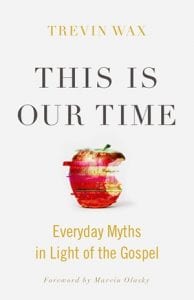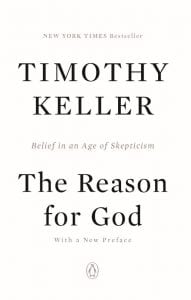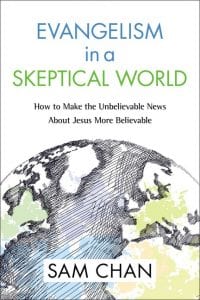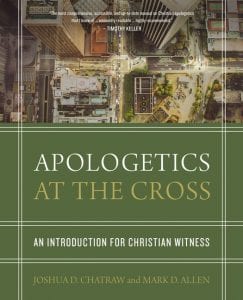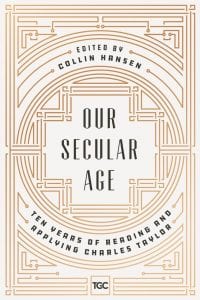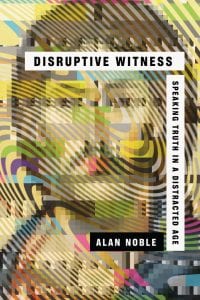Ten years ago, a relatively unknown pastor published The Reason for God: Belief in an Age of Skepticism.
Tim Keller’s book leaped onto The New York Times bestseller list, grabbing acclaim from The Washington Post columnists and Publishers Weekly and awards from World magazine and Christianity Today. The book is still ranked a #1 best-seller in evangelism at Amazon.
Without question, The Reason for God was a home run.
So it was a surprise when Keller’s next big swing at convincing nonbelievers to believe in God used an entirely different approach. He released Making Sense of God: An Invitation to the Skeptical in 2016.
Since then, a slew of like-minded books have joined Making Sense. This Is Our Time: Everyday Myths in Light of the Gospel came out in March 2017, followed by Our Secular Age: Ten Years of Reading and Applying Charles Taylor in September 2017, Evangelism in a Skeptical World: How to Make the Unbelievable News About Jesus More Believable in March 2018, Apologetics at the Cross: An Introduction for Christian Witness in May 2018, and Disruptive Witness: Speaking Truth in a Distracted Age in July 2018. Confronting Christianity: 12 Hard Questions for the World’s Largest Religion will hit shelves in April 2019.
All were in some ways sparked by Keller, and all aim to help the church meet the evolving challenge of witnessing in a post-Christian context.
“In the past, apologetics could be left to a certain type of ‘expert,’ a type of person with a proclivity for such mental exercises and argumentation,” resident theologian at Holy Trinity Anglican Church Josh Chatraw wrote in Didaktikos Journal this summer. “Now believers are finding they need apologetics just to have a conversation about the gospel with their neighbor or their teenage son.”
Take Two
“Wait, another Tim Keller book for skeptics? Really?” TGC asked when Making Sense hit the shelves. Keller didn’t try to hide the surface similarities. He used the same calm and logical tone. Even the title was a reworked version of The Reason for God.
So why two?
The most obvious reason to need a new apologetics book is sexuality: In 2008, voters in California voted to make same-sex marriage illegal through Proposition 8; in 2015, the Supreme Court legalized it for the entire country. In between, assault based on sexual orientation was criminalized, gay men and lesbians began serving openly in the military, and the first openly gay politician was elected to the U.S. Senate.
“Sexuality, same-sex marriage, and gender are now ‘apologetics’ issues,” Keller told TGC. “That wasn’t the case 20 years ago. They didn’t come up in talking to non-Christians, but today they almost always do.”
But sexuality wasn’t the only reason—or even the main reason—Keller wrote Making Sense.
Here it is: “The biggest difference is that Christianity used to have cultural familiarity and modest respect,” Keller told TGC. Before, “most Americans not only had a rudimentary knowledge of Christianity but also tended to respect it, or at least feel they ought to show some respect.”
The exponential growth in competing lifestyles and worldviews in the modern West has made the exclusivity of the Christian faith seem quaint, said Oklahoma Baptist professor Alan Noble. “Catholic philosopher Charles Taylor describes this growth as ‘secularism,’ a condition in which there is an overwhelming number of possible belief systems available to us, all of which are tenuous and contested.”
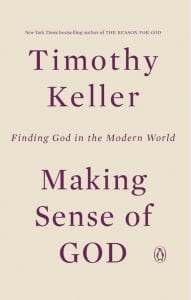
In response, expressive individualism has taken deep root in the culture, said Noble, who released Disruptive Witness in July. “Since external sources of meaning seem impossible to adjudicate, modern people turn inward to discover their ‘true self’ and live ‘authentically’ to that self through self-expression. For societies that have accepted expressive individualism, Christianity is only persuasive insofar as it fits an individual’s sense of style, branding, or image.”
This secularism—and the ubiquity of technology and distraction—make it it increasingly easy for people to live pleasurable lives without ever truly acknowledging and wrestling with life’s big, essential questions, Noble said.
Chatraw agrees. “Some people are still asking traditional questions, but often people are first asking another set of questions,” he said. “That is, if they are asking questions at all. Often they are dismissive of and unconcerned with traditional religion; after all, they have their own life goals to pursue.”
So non-Christians aren’t asking if science disproves Christianity (obviously) or if they should take the Bible literally (obviously not) or if the church’s past sins negate the gospel message (since it’s not real, who cares?).
In the country with the largest population of Christians, many nonbelievers aren’t even up to that level of interaction with Christianity.
Not Enough
The United States was baptized into Judeo-Christianity as an infant—from the Declaration of Independence (“endowed by their Creator with certain unalienable rights”) to the first Constitutional amendment (“Congress shall make no law respecting an establishment of religion, or prohibiting the free exercise thereof”) to the population itself (98 percent of colonists identified as Protestant).
And while the level of authentic belief has waxed and waned (think the Great Awakenings), the language and culture of Christianity has remained familiar to Americans. So much so that for years, “we believed that the mission field was [only] overseas,” Keller said.
At home, “you went to Sunday school—even if your parents didn’t go to church,” said Sam Chan, Australian apologist and author of Evangelism in a Skeptical World. “You played ball with a local church. You were in a community of believers.”
So much so that nonbelievers showed up at Billy Graham crusades in church buses. “When he gave you a 20-minute Bible talk, you already had structures, a DNA, a worldview,” Chan said. Conversion was just a matter of tipping over into believing what you already knew.
Back then, belief was “thick,” Keller said. “Fifty years ago, virtually everybody had generic religious beliefs. They believed in a personal God, in an afterlife, in guilt and sin.”
But in the 1970s, religion in America had begun to drop off. By the 1990s, the downward trend in religious identity, church attendance, and belief in the importance of religion was alarmingly sharp.
Many who rejected Christianity cited science or lack of empirical evidence.
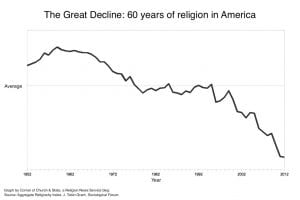
“We didn’t think about ourselves as emotional,” Chan said. “We were autonomous, rational thinkers, free to think for ourselves.”
So that’s where apologetics (the defense of Christianity) aimed. Building off the thoughtful, academic foundations laid by the likes of C. S. Lewis and G. K. Chesterton, American apologists tried to provide logical arguments or historical evidence to convince their audience of the Bible’s veracity. Josh McDowell wrote Evidence that Demands a Verdict: Life-Changing Truth for a Skeptical World in 1972, Ravi Zacharias released Jesus Among Other Gods: The Absolute Claims of the Christian Message in 1990, and Lee Strobel published The Case for Christ: A Journalist’s Personal Investigation of the Evidence for Jesus in 1998.
That’s also where Keller positioned The Reason for God. (At Amazon, it’s “frequently bought together” with Lewis’s Mere Christianity.)
But Keller spends a lot of time with non-Christians, and it wasn’t long before he knew The Reason for God wasn’t enough.
Inside Their View
America spent the 2010s becoming “more spiritual than religious.” Even saying “I’m a Christian” no longer necessarily means you read your Bible, go to church, or believe in the God of the Bible.
But people have to have “working answers to big questions,” Keller said. Some examples: What’s my meaning in life? How do I handle suffering? How do I face death? How do I ever really find satisfaction? How do I get an identity that’s not unstable and fragile?
Today’s nonbelievers fill in their own answers—“Follow your passion,” “Stand up for moral values and human rights (and you don’t need God to do it),” or simply “You do you.”
Around 2014, two Liberty University professors noticed that the traditional apologetics approach of equipping people with facts and figures “wasn’t working for our students,” said Chatraw, then the director of the Center for Apologetics and Cultural Engagement at Liberty.
“That information is good, but apologetics can’t just be a dump truck of information,” said Chatraw, who wrote Apologetics at the Cross with Liberty’s Mark Allen. “That isn’t how productive conversation works.”
Actually, a good conversationalist—a good friend—mostly listens.
“Of course we need to speak and make appeals for the gospel,” Chatraw said. “But listening and hearing people out—in a culture where people feel like they have to get their points out before they get cut off—can plow the ground for gospel conversation.”
Careful listening helps a Christian understand the worldview of their non-Christian friend, allows them to love that person with their time and attention, and lets them press back on weaknesses and inconsistencies. Listening also builds credibility, so when the conversation spins toward Christianity, it’s a natural and hopeful turn.
So Chatraw and Allen told their students: “You might not know much about where [a nonbeliever] is coming from. That’s why you start asking questions. Ask about their beliefs, their struggles. Start inside of their view.”
It’s a humble way to engage. “I think it’s what the gospel drives us to, this others-centered view,” Chatraw said. “It’s incarnational—how can I step inside their world and try to understand?”
Christianity in America used to be a matter of tipping over into believing what you already knew. Those days are gone.
Where there is worldview overlap—a desire for justice or mercy or beauty—Christians can affirm the similarity. But all of that comes from God, so Christians can also push on the secular narrative until it unravels—for example, if there is no God and we evolve through survival of the fittest, why should we care for the poor?
Chatraw and Allen call it “inside-out” apologetics; The Gospel Project general editor Trevin Wax calls it “making a path to get to the path.” Rachel Gilson, Cru director for theological development in the Northeast, calls it inviting people into the process.
“They’re all saying the same thing,” Keller said. “Arguably, it’s what Augustine was doing. Before you defend Christianity, you have to critique the polytheistic culture.”
“Right now the cultural storyline is looking for purpose, meaning, happiness, and freedom,” Chan said. “The gospel has those things. Jesus will set you free and give you rest. We just need to adapt the storyline.”
Adding Beauty to Truth
“Modernism and the Enlightenment put the exclamation point on the truth part of truth, goodness, and beauty, and attempted to separate it from the other two ideals,” Chatraw said.
And getting that right is crucial. In a post-truth world, the claims of Christianity can seem exclusive and ridiculous. Sloppy apologetics only exacerbates this problem.
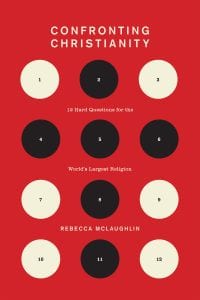 “One of my frustrations with apologetics over the years has been that it hasn’t always represented the best Christian thinking,” said Rebecca McLaughlin, author of the forthcoming Confronting Christianity. “We are often trying to take down academic fields without first listening to the Christians who are world leaders in those fields and leveraging their insights.”
“One of my frustrations with apologetics over the years has been that it hasn’t always represented the best Christian thinking,” said Rebecca McLaughlin, author of the forthcoming Confronting Christianity. “We are often trying to take down academic fields without first listening to the Christians who are world leaders in those fields and leveraging their insights.”
Christians “literally invented science and literally invented the university,” she said. Though most universities are increasingly secular, “there are serious Christians at the top of the academy in practically every field. . . . Our posture needs to change from, ‘How can we discredit the academy?’ to ‘Isn’t this exciting?’”
But convincing today’s nonbelievers is going to take more than laying out the nearly impossible odds that life sprang up on its own or the historical evidence for Jesus. Truth is cheaper to a generation that carries access to nearly all the world’s information in their pockets.
“We’re not necessarily coming to them as holders of spiritual information,” said Gilson, who started her journey to Christ through Google. “They can go online and find the answers to their questions.”
Instead, “the students I’m working with now really want to be part of the process,” she said. They need help to sift through “the good and the garbage.”
After all, neither Christian nor non-Christian “can prove their views of God or identity,” Keller said. “Therefore, we need to look at our views [and theirs] and compare them—see which ones fit human nature the best and seem more reasonable.”
Not only reasonable, but also good, Gilson said.
“That’s where we’re hitting some major themes on holding to God’s sexual ethics, because they perceive so clearly that some people’s sexual sin is being called out more than others,” she said. “That burns them. They want to love their neighbor. They want to dump what looks hurtful in order to preserve their brothers and sisters, not realizing if they call sin ‘not sin,’ they’re just tying a millstone around their necks.”
So even as our neighbors lose belief in the truth of the gospel, they’re still, on a gut level, looking for its goodness and beauty.
Gut Level
To be clear, converts are always won by the work of the Holy Spirit, Keller said. Christians evangelize because “God commanded us to, so it would be churlish and silly to say, ‘No—because I know you’re going to save people anyway and you’re more effective than I am.’”
Christian apologists, then, are clearing obstacles to the Spirit’s work of regeneration.
“You can’t reason all the way to conversion with a fallen man,” TGC editorial director Collin Hansen said. “They can’t think God’s thoughts without regeneration. But you can poke holes and doubts in their own beliefs. You can help them to doubt their doubts.”
One way to do that is by refusing to play by the world’s presuppositions, Keller told church leaders in Chicago last month.
“Our culture says, ‘Look, we are objective and rational. And if you Christians will come up to our high standards of objective rationality, we would be happy to give you a hearing,’” he said. “That’s not what the early Christians did. They critiqued the standards. . . . You need to say to the culture, ‘Your standards don’t work. You’re not objective.’ . . . The modern understanding of reality doesn’t fit in with human nature.”
Recent behavioral psychology supports this view, explaining that humans don’t typically make decisions logically.
“We’re not primarily rational beings who array our arguments against one another until one side or another prevails,” Hansen said. “We are profoundly driven by our emotions, our passions, our affections, and ultimately our intuitions.”
Our emotions and our desire for community (think tribes) drive our decisions, which we then follow with rationalizations, social psychologist Jonathan Haidt argues.
So this means that before non-Christians convert, they must want to believe. They will often think, Isn’t this beautiful? Wouldn’t it be great if this were true? I wish this were true.
That’s exactly what Keller offers in Making Sense. After pressing on modern worldviews (“If there is no God, you will have to turn some created thing into a god to worship, and whatever that thing is, it will punish you with inner fears, resentment, guilt, and shame if you fail to achieve it.”), he offers the true and better alternative of Christianity (“When a Christian grasps how Jesus saved us at infinite cost to himself, how he emptied himself of his glory and took on a humble form to serve our best interests, it creates a grateful joy that inwardly moves us to want to please, know, and resemble him.”)
Tell a Story
The best way to stir imagination is—as Hollywood knows—to tell a story.
“A lot of people have a deconversion story, which means they’ve swapped the old story of the gospel for what they think is a better story,” Chan said. “[UK Christian psychiatrist] Glynn Harrison says the reason we lost the debate on sex and morality is the liberal, secular West has been telling a better story.”
Ex-Christians lay out their religious credentials, then explain the “unimaginable relief” of leaving Christianity, of wishing “I had let go of faith in a god years ago.” Movies, sitcoms, and social media show happy same-sex couples making it work, or people enthusiastically sleeping with multiple partners, or heroes pursuing their goals by any means necessary.
“In apologetics, we’ve been trying to give facts and data, when we really need to tell a better story,” Chan said. “We have to win the imagination, not just the debate.”
“I love how Making Sense of God enters their worldview and speaks what [nonbelievers] want, quoting their authors, getting them nodding, then bit by bit saying, ‘Huh, it’s not going to work this way,’” Chan said. “It would be really powerful if someone could complement that with a story.”
That’s not a new idea—professors teach it practically on the first day of seminary. Logic and story are a combination Lewis uses with Screwtape and with Narnia. It’s a combination the New Testament uses with history and letters. Jesus himself uses it with sermons and parables.
Story is a soft entry, a gentle way to lead nonbelievers to examine their worldview, which may lead to openness to another worldview, which may lead (finally) to traditional apologetics.
And that’s good news. Because if you need a story, then every Christian is equipped to tackle today’s apologetics.
New Face
“Jesus often answered a question with a question,” Chan said. “It’s how counseling works.”
He remembers a colleague who was angry that a local Christian church was spreading leaflets on his street.
“How dare they?” the man asked.
Chan didn’t have an immediate answer. Later, his friend—who is also a chaplain—supplied one.
“You should have asked him why that made him so angry,” he told Chan. “All you have to do is get him to speak back. People are only two ‘why?’ questions away from not having an answer. Just keep asking questions until they have no answer, and then say, ‘Hmm.’ At that moment, they’ll realize, ‘I’m not as well-thought as I thought I was.’”
So the new face of apologetics isn’t up on stage. It’s in a coffee shop or break room, sharing stories and saying “tell me why you think that” until the answers run out.
Even as our neighbors lose belief in the truth of the gospel, they’re still, on a gut level, looking for its goodness and beauty.
It’s less efficient, certainly, than converting dozens—or even hundreds—at once in a youth conference or weekend retreat. But in the tougher soil of a post-Christian culture, it’s the slow preparation that must be done. And as public conversations about Christianity are more and more contentious, the move to intimate conversations makes even more sense, Chan said.
“Modern selves are so internal,” Keller said. “In the old days if you were convinced of the truth, you changed yourself. Now we adopt the truth as accessories that fit in with who we want to be.”
He tells campus ministries they need a lot more staff. “It means having a dozen or so ongoing non-Christian relationships. . . . You have to work with fewer students over longer conversations.”
More Hopeful
While the approach to apologetics may shift, one thing does not: Christianity is always more true, beautiful, and good than any alternative.
Responding to changes in culture just means reaching for a different biblical answer, Chan said. “Typically we’ve used the salvation and historical sections of the Bible to try to evangelize. Now we can use wisdom literature as the entry point. We can show them the better story to managing sex and marriage and work found in Proverbs or Ecclesiastes.”
That’s a good approach to take with people who are less likely to wonder if intelligence could come from non-intelligence, and more likely to wrestle with meaning or to sense deep beauty in their love for their children, Chatraw said.
“The church has a long history of people who are appealing to the goodness and beauty part of the gospel,” he said. “We can retrieve those and apply them to the present context.”
“It’s not about merely defeating non-Christians in an argument,” Hansen said. “It’s about showing them the beauty of the gospel. ‘Doesn’t this make more sense?’ ‘Isn’t this more hopeful?’ ‘Isn’t this more plausible?’”
Free eBook by Tim Keller: ‘The Freedom of Self-Forgetfulness’
 Imagine a life where you don’t feel inadequate, easily offended, desperate to prove yourself, or endlessly preoccupied with how you look to others. Imagine relishing, not resenting, the success of others. Living this way isn’t far-fetched. It’s actually guaranteed to believers, as they learn to receive God’s approval, rather than striving to earn it.
Imagine a life where you don’t feel inadequate, easily offended, desperate to prove yourself, or endlessly preoccupied with how you look to others. Imagine relishing, not resenting, the success of others. Living this way isn’t far-fetched. It’s actually guaranteed to believers, as they learn to receive God’s approval, rather than striving to earn it.
In Tim Keller’s short ebook, The Freedom of Self-Forgetfulness: The Path To True Christian Joy, he explains how to overcome the toxic tendencies of our age一not by diluting biblical truth or denying our differences一but by rooting our identity in Christ.
TGC is offering this Keller resource for free, so you can discover the “blessed rest” that only self-forgetfulness brings.













